hiroshima-the-liveliest-city-in-japan高级英语(一)第二课培训资料
自己整理的高英句子翻译

Lesson 2 Hiroshima -- the "Liveliest”City in Japan1)礼堂里一个人都没有,会议一定是延期了。
There is not a soul in the hall. The meeting must have been put off.2)那本书看上去很像个盒子。
The book looks very much like a box.3) 四川话和湖北话很相似,有时难以区别。
Sichuan dialect sounds much the same as Hubei dialect. It is sometimes difficult to tell one from the other.4) 一看见纪念碑就想起了在战斗中死去的好友。
The very sight of the monument reminds me of my good friend who was killed in the battle.5)他陷入沉思之中,没有理会同伴们在谈些什么。
He was so deep in thought that he was oblivious of what his friends were talking about.6)他干的事与她毫无关系。
What he did had nothing to do with her.7)她睡不着觉,女儿的病使她心事重重。
She couldn’t fall asleep as her daughter’s illness was very much on her mind.8)这件事长期以来一直使我放心不下。
I have had the matter on my mind for a long time.9)他喜欢这些聚会,喜欢与年轻人交往并就各种问题交换意见。
He loves such gatherings at which he rubs shoulders with young people and exchanges opinions with them on various subjects.10)大家在几分钟以后才领悟他话中的含意。
Lesson 2 Hiroshima-the Liveliest City in Japan课文翻译资料

L e s s o n2H i r o s h i m a-t h eL i v e l i e s t C i t y i n J a p a n课文翻译第二课广岛——日本“最有活力”的城市(节选)雅各•丹瓦①“广岛到了!大家请下车!”当世界上最快的高速列车减速驶进广岛车站并渐渐停稳时,那位身着日本火车站站长制服的男人口中喊出的一定是这样的话。
我其实并没有听懂他在说些什么,一是因为他是用日语喊的。
其次,则是因为我当时心情沉重,喉咙哽噎,忧思万缕,几乎顾不上去管那日本铁路官员说些什么。
踏上这块土地,呼吸着广岛的空气,对我来说这行动本身已是一套令人激动的经历,其意义远远超过我以往所进行的任何一次旅行或采访活动。
难道我不就是在犯罪现场吗?②这儿的日本人看来倒没有我这样的忧伤情绪。
从车站外的人行道上看去,这儿的一切似乎都与日本其他城市没什么两样。
身着和嘏的小姑娘和上了年纪的太太与西装打扮的少年和妇女摩肩接豫;神情严肃的男人们对周围的人群似乎视而不见,只顾着相互交淡,并不停地点头弯腰,互致问候:“多么阿里伽多戈扎伊马嘶。
”还有人在使用杂货铺和烟草店门前挂着的小巧的红色电话通话。
③“嗨!嗨!”出租汽车司机一看见旅客,就砰地打开车门,这样打着招呼。
“嗨”,或者某个发音近似“嗨”的什么词,意思是“对”或“是”。
“能送我到市政厅吗?”司机对着后视镜冲我一笑,又连声“嗨!”“嗨!”出租车穿过广岛市区狭窄的街巷全速奔驰,我们的身子随着司机手中方向盘的一次次急转而前俯后仰,东倒西歪。
与此同时,这座曾惨遭劫难的城市的高楼大厦则一座座地从我们身边飞掠而过。
④正当我开始觉得路程太长时,汽车嘎地一声停了下来,司机下车去向警察问路。
就像东京的情形一样,广岛的出租车司机对他们所在的城市往往不太熟悉,但因为怕在外国人面前丢脸,却又从不肯承认这一点。
无论乘客指定的目的地在哪里,他们都毫不犹豫地应承下来,根本不考虑自己要花多长时间才能找到目的地。
(完整word版)Lesson 2 Hiroshima-the Liveliest City in Japan课文翻译
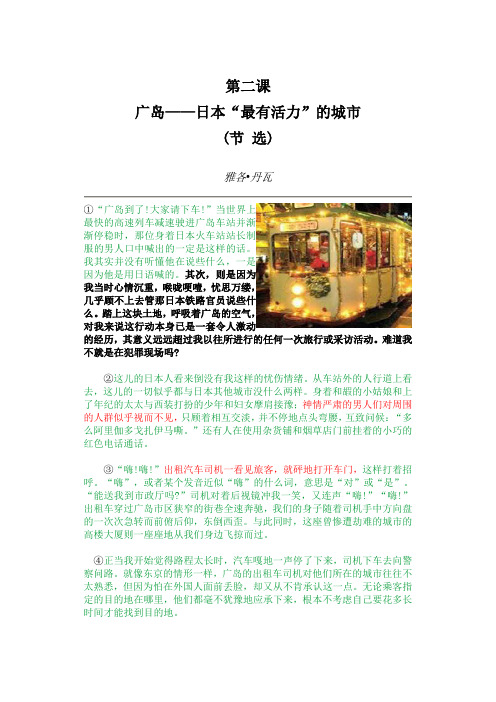
第二课广岛——日本“最有活力”的城市(节选)雅各•丹瓦①“广岛到了!大家请下车!”当世界上最快的高速列车减速驶进广岛车站并渐渐停稳时,那位身着日本火车站站长制服的男人口中喊出的一定是这样的话。
我其实并没有听懂他在说些什么,一是因为他是用日语喊的。
其次,则是因为我当时心情沉重,喉咙哽噎,忧思万缕,几乎顾不上去管那日本铁路官员说些什么。
踏上这块土地,呼吸着广岛的空气,对我来说这行动本身已是一套令人激动的经历,其意义远远超过我以往所进行的任何一次旅行或采访活动。
难道我不就是在犯罪现场吗?②这儿的日本人看来倒没有我这样的忧伤情绪。
从车站外的人行道上看去,这儿的一切似乎都与日本其他城市没什么两样。
身着和嘏的小姑娘和上了年纪的太太与西装打扮的少年和妇女摩肩接豫;神情严肃的男人们对周围的人群似乎视而不见,只顾着相互交淡,并不停地点头弯腰,互致问候:“多么阿里伽多戈扎伊马嘶。
”还有人在使用杂货铺和烟草店门前挂着的小巧的红色电话通话。
③“嗨!嗨!”出租汽车司机一看见旅客,就砰地打开车门,这样打着招呼。
“嗨”,或者某个发音近似“嗨”的什么词,意思是“对”或“是”。
“能送我到市政厅吗?”司机对着后视镜冲我一笑,又连声“嗨!”“嗨!”出租车穿过广岛市区狭窄的街巷全速奔驰,我们的身子随着司机手中方向盘的一次次急转而前俯后仰,东倒西歪。
与此同时,这座曾惨遭劫难的城市的高楼大厦则一座座地从我们身边飞掠而过。
④正当我开始觉得路程太长时,汽车嘎地一声停了下来,司机下车去向警察问路。
就像东京的情形一样,广岛的出租车司机对他们所在的城市往往不太熟悉,但因为怕在外国人面前丢脸,却又从不肯承认这一点。
无论乘客指定的目的地在哪里,他们都毫不犹豫地应承下来,根本不考虑自己要花多长时间才能找到目的地。
⑤这段小插曲后来终于结束了,我也就不知不觉地突然来到了宏伟的市政厅大楼前。
当我出示了市长应我的采访要求而发送的请柬后,市政厅接待人员向我深深地鞠了一躬,然后声调悠扬地长叹了一口气。
高级英语lesson2课文翻译
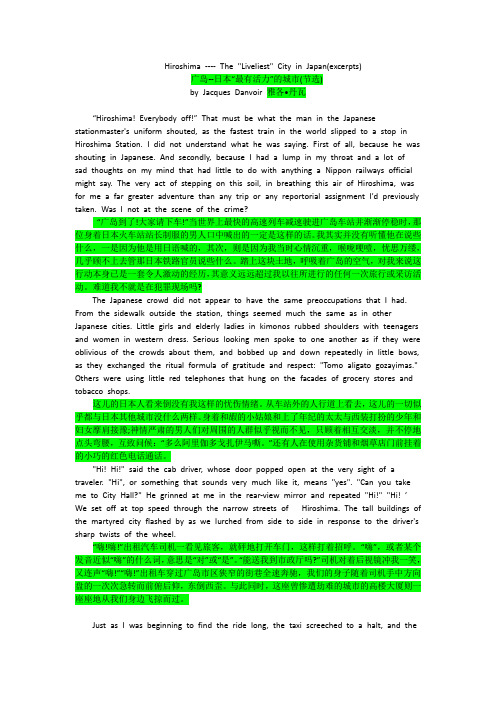
Hiroshima ---- The "Liveliest" City in Japan(excerpts)广岛--日本“最有活力”的城市(节选)by Jacques Danvoir 雅各•丹瓦“Hiroshima!Everybody off!”That must be what the man in the Japanese stationmaster's uniform shouted, as the fastest train in the world slipped to a stop in Hiroshima Station. I did not understand what he was saying. First of all, because he was shouting in Japanese. And secondly, because I had a lump in my throat and a lot ofsad thoughts on my mind that had little to do with anything a Nippon railways official might say. The very act of stepping on this soil, in breathing this air of Hiroshima, was for me a far greater adventure than any trip or any reportorial assignment I'd previously taken. Was I not at the scene of the crime?“广岛到了!大家请下车!”当世界上最快的高速列车减速驶进广岛车站并渐渐停稳时,那位身着日本火车站站长制服的男人口中喊出的一定是这样的话。
高级英语第二册课文
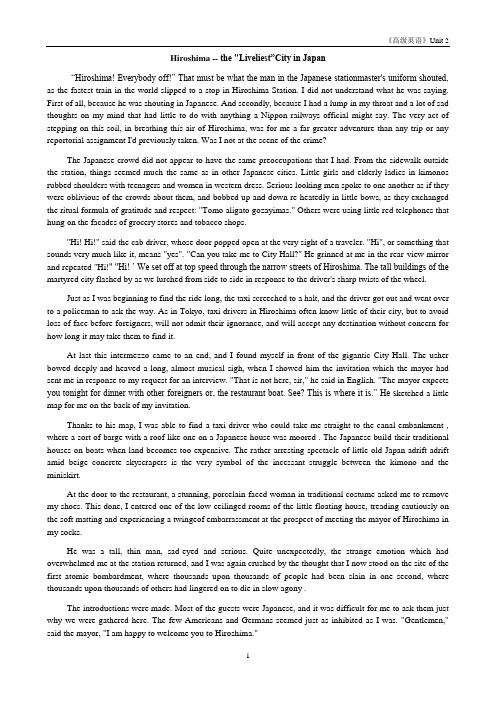
Hiroshima -- the "Liveliest”City in Japan“Hiroshima! Everybody off!” That must be what the man in the Japanese stationmaster's uniform shouted, as the fastest train in the world slipped to a stop in Hiroshima Station. I did not understand what he was saying. First of all, because he was shouting in Japanese. And secondly, because I had a lump in my throat and a lot of sad thoughts on my mind that had little to do with anything a Nippon railways official might say. The very act of stepping on this soil, in breathing this air of Hiroshima, was for me a far greater adventure than any trip or any reportorial assignment I'd previously taken. Was I not at the scene of the crime?The Japanese crowd did not appear to have the same preoccupations that I had. From the sidewalk outside the station, things seemed much the same as in other Japanese cities. Little girls and elderly ladies in kimonos rubbed shoulders with teenagers and women in western dress. Serious looking men spoke to one another as if they were oblivious of the crowds about them, and bobbed up and down re-heatedly in little bows, as they exchanged the ritual formula of gratitude and respect: "Tomo aligato gozayimas." Others were using little red telephones that hung on the facades of grocery stores and tobacco shops."Hi! Hi!" said the cab driver, whose door popped open at the very sight of a traveler. "Hi", or something that sounds very much like it, means "yes". "Can you take me to City Hall?" He grinned at me in the rear-view mirror and repeated "Hi!" "Hi! ’ We set off at top speed through the narrow streets of Hiroshima. The tall buildings of the martyred city flashed by as we lurched from side to side in response to the driver's sharp twists of the wheel.Just as I was beginning to find the ride long, the taxi screeched to a halt, and the driver got out and went over to a policeman to ask the way. As in Tokyo, taxi drivers in Hiroshima often know little of their city, but to avoid loss of face before foreigners, will not admit their ignorance, and will accept any destination without concern for how long it may take them to find it.At last this intermezzo came to an end, and I found myself in front of the gigantic City Hall. The usher bowed deeply and heaved a long, almost musical sigh, when I showed him the invitation which the mayor had sent me in response to my request for an interview. "That is not here, sir," he said in English. "The mayor expects you tonight for dinner with other foreigners or, the restaurant boat. See? This is where it is.” He s ketched a little map for me on the back of my invitation.Thanks to his map, I was able to find a taxi driver who could take me straight to the canal embankment , where a sort of barge with a roof like one on a Japanese house was moored . The Japanese build their traditional houses on boats when land becomes too expensive. The rather arresting spectacle of little old Japan adrift adrift amid beige concrete skyscrapers is the very symbol of the incessant struggle between the kimono and the miniskirt.At the door to the restaurant, a stunning, porcelain-faced woman in traditional costume asked me to remove my shoes. This done, I entered one of the low-ceilinged rooms of the little floating house, treading cautiously on the soft matting and experiencing a twingeof embarrassment at the prospect of meeting the mayor of Hiroshima in my socks.He was a tall, thin man, sad-eyed and serious. Quite unexpectedly, the strange emotion which had overwhelmed me at the station returned, and I was again crushed by the thought that I now stood on the site of the first atomic bombardment, where thousands upon thousands of people had been slain in one second, where thousands upon thousands of others had lingered on to die in slow agony .The introductions were made. Most of the guests were Japanese, and it was difficult for me to ask them just why we were gathered here. The few Americans and Germans seemed just as inhibited as I was. "Gentlemen," said the mayor, "I am happy to welcome you to Hiroshima."Everyone bowed, including the Westerners. After three days in Japan, the spinal column becomes extraordinarily flexible."Gentlemen, it is a very great honor to have you her e in Hiroshima."There were fresh bows, and the faces grew more and more serious each time the name Hiroshima was repeated."Hiroshima, as you know, is a city familiar to everyone,” continued the mayor."Yes, yes, of course,” murmured the company, more and more agitated."Seldom has a city gained such world renown, and I am proud and happy to welcome you to Hiroshima, a town known throughout the world for its--- oysters".I was just about to make my little bow of assent, when the meaning of these last words sank in, jolting me out of my sad reverie ."Hiroshima – oysters? What about the bomb and the misery and humanity's most heinous crime?" While the mayor went on with his speech in praise of southern Japanese sea food, I cautiously backed away and headed toward the far side of the room, where a few men were talking among themselves and paying little attention to the mayor's speech. "You look puzzled," said a small Japanese man with very large eye-glasses."Well, I must confess that I did not expect a speech about oysters here. I thought that Hiroshima still felt the impact of the atomic impact .""No one talks about it any more, and no one wants to, especially, the people who were born here or who lived through it. "Do you feel the same way, too?""I was here, but I was not in the center of town. I tell you this because I am almost an old man. There are two different schools of thought in this city of oysters, one that would like to preserve traces of the bomb, and the other that would like to get rid of everything, even the monument that was erected at the point of impact. They would also like to demolish the atomic museum.""Why would they want to do that?""Because it hurts everybody, and because time marches on. That is why." The small Japanese man smiled, his eyes nearly closed behind their thick lenses. "If you write about this city, do not forget to say that it is the gayest city in Japan, even it many of the town's people still bear hidden wounds, and burns."Like any other, the hospital smelled of formaldehyde and ethere . Stretchers and wheelchairs lined the walls of endless corridors, and nurses walked by carrying Stretchers instruments, the very sight of which would send shivers down the spine of any healthy visitor. The so-called atomic section was located on the third floor. It consisted of 17 beds."I am a fisherman by trade. I have been here a very long time, more than twenty years, "said an old man in Japanese pajamas. “What is wrong with you?”"Something inside. I was in Hiroshima when it happened. I saw the fire ball. But I had no burns on my face or body. I ran all over the city looking for missing friends and relatives. I thought somehow I had been spared. But later my hair began to fall out, and my belly turned to water. I felt sick, and ever since then they have been testing and treating me. "The doctor at my side explained and commented upon the old man's story, "We still hare a handful of patients here who are being kept alive by constant car e. The other s died as a result of their injuries, or else committed suicide. ""Why did they commit suicide?""It is humiliating to survive in this city. If you bear any visible scars of atomic burns, your children will encounter prejudice on the par t of those who do not. No one will marry the daughter or the niece of an atomic bomb victim. People are afraid of genetic damage from the radiation." The old fisherman gazed at me politely and with interest.Hanging over the patient was a big ball made of bits of brightly colored paper, folded into the shape of tiny birds. "What's that?" I asked."Those are my lucky birds. Each day that I escape death, each day of suffering that helps to free me from earthly cares, I make a new little paper bird, and add it to the others. This way I look at them and congratulate myself of the good fortune that my illness has brought me. Because, thanks to it, I have the opportunity to improve my character."Once again, outside in the open air, I tore into little pieces a small notebook with questions that I'd prepared in advance for inter views with the patients of the atomic ward. Among them was the question: Do you really think that Hiroshima is the liveliest city in Japan? I never asked it. But I could read the answer in every eye.ExercisesI.Give brief answers to the following questions, using your own words as much as possible:1) Can you guess the writer's occupation, and perhaps, his nationality?2) What do you think was the aim of the visit?3) What thoughts were on his mind? Were there other visitors from abroad? Did they share his views? How do you know?4) What was his attitude towards Hiroshima?5) Were the Japanese preoccupied with the same thoughts as the writer was ?6) Was Hiroshima in any way different from other Japanese cities?7) The bomb was dropped on Hiroshima in August 1945. How has the city been rebuilt since then?8) Even in this short description one may find some of the problems of Japan, or at least, of Hiroshima. Can you say what they are?9) Why didn' t the writer ask the patients of the atomic ward the questions he had prepared in advance?10) What was the answer he read in every eyeⅡ .Paraphrase:1) Serious looking men spoke to one another as if they were oblivious of the crowds about them.2) The cab driver’ s doo r popped open at the very sight of a traveler.3) The rather arresting spectacle of little old Japan adrift amid beige concrete skyscrapers is the very symbol of the incessant struggle between the kimono and the miniskirt.4) I experienced a twinge of embarrassment at the prospect of meeting the mayor of Hiroshima in my socks.5) The few Americans and Germans seemed just as inhibited as I was.6) After three days in Japan, the spinal column becomes extraordinarily flexible.7) I was about to make my little bow of assent, when the meaning of these last words sank in, jolting me out of my sad reverie.8) I thought somehow I had been spared.III .Translate the following into Chinese:1) And secondly, because I had a lump in my throat and a lot of sad thoughts on my mind that had little to do with anything a Nippon railways official might say. The very act of stepping on this soil, in breathing this air ofHiroshima, was for me a far greater adventure than any trip or any reportorial assignment I' d previously taken. Was 1 not at the scene of the crime?2) Quite unexpectedly, the strange emotion which had over-whelmed me at the station returned, and I was again crushed by the thought that I now stood on the site of the first atomic bombardment, where thousands upon thousands of people had been slain in one second, where thousands upon thou-sands of others had lingered on to die in slow agony.3) “There are two different schools of thought in this city of oysters, one that would like to preserve traces of the bomb, and the other that would like to get rid of everything, even the monument that was erected at the point of impact."4) "If you bear any visible scars of atomic burns, your children will encounter prejudice on the part of those who do not."5) "Each day that I escape death, each day of suffering that helps to free me from earthly cares, I make a new little paper bird, and add it to the others. This way I look at them and congratulate myself on the good fortune that illness has brought me. Because, thanks to it, I have the opportunity to improve my character. "IV.Explain how the following adjectives are formed. Give examples to illustrate the different ways of compounding adjectives.1) timesaving, painstaking 2) man-made, poverty-stricken3) carefree, snow-white 4) porcelain-faced, chicken-hearted5) sad-eyed, low-ceilinged 6) longstanding, good-looking7) full-fledged, ready-madeV .Explain how the meaning of the following sentences is affected when the italicized words are replaced with the words in brackets. Pay attention to the shades of meaning of the words.1) That must be what the man shouted. (was)2) Was I not at the scene of the crime? ( Was I at the scene...?)3) Elderly ladies rubbed shoulders with teen-agers. (old)4) He grinned at me in the rear-view mirror. (smiled, laughed)5) He sketched a little map on the back of my invitation. (drew)6) I treaded cautiously on the tatami matting. (carefully)7) I stood on the site of the first atomic bombardment. (spot)8) They would also like to demolish the atomic museum. (destroy)9) It is the gayest city in Japan. (most delightful)10) The old fisherman gazed at me politely and with interest.( stared)VI. Replace the italicized words with simple, everyday words:1) The very act... was for me a far greater adventure than any trip or any reportorial assignment I’ d previously taken. ( )2) as if they were oblivious of the crowds about them ( )3) Others were using little red telephones that hung on the facades of grocery stores and tobacco shops. ( )4) The rather arresting spectacle of little old Japan adrift amid beige concrete skyscrapers is the very symbol of the incessant struggle between the kimono and the miniskirt. ( ) ( ) ( )5) and experiencing a twinge of embarrassment at the prospect of meeting the mayor of Hiroshima in my socks( ) ( )6) where thousands upon thousands of people had been slain in one second ( )7) where thousands upon thousands of others had lingered on to die in slow agony ( )8) Seldom has a city gained such world renown. ( )9) jolting me out of my sad reverie ( )10) I thought that Hiroshima still felt the impact of the atomic cataclysm. ( )11) They would also like to demolish the atomic museum.( )12) your children will encounter prejudice on the part of those who do not ( )VII. Translate the following into Chinese:1) What he said just now had little to do with the question under discussion.2) The site of the battle brought back to him memories of the fiery year s of the Anti-Japanese War.3) He was so absorbed in his work that he was oblivious of the goings-on around him.4) The newspaper reporters got excited at the very sight of the Nobel Prize winner.5) -- What was the word the teacher used? I didn' t quite catch it.-- Nor did I, but it sounded very much like "preoccupation".6) Another turn and we found ourselves in a spacious cavern bigenough to hold a couple of hundred people.7) People listened with open-mouthed astonishment while the shocking news sank in.8) Molten iron is poured into the mixer much in the same way as tea is poured into a cup from a teapot.9) The unsuccessful operation weighed heavily on the young surgeon' s mind.10) The general often went to the barracks and rubbed shoulders with the rank and file.VIII. Choose the right words to complete the following sentences and make changes where necessary.1) Since the conference was held on Chinese ___, security was no problem. (soil, earth)2) The ____ here is sandy, and therefore, very poor. (soil, earth)3) He is so strong that he can carry four basketfuls of at a time. (soil, earth)4) He is a down-to- sort of fellow. (soil, earth)5) His face is _ __ me, but I can’ t recall his name. (familiar with, familiar to)6) Are you _ _ these technical terms? (familiar with, familiar to)7) I was ___when he told me that he and his brother were born on the same day but were not twins. "We have a sister of the same age, you see' so we are triplets!” He grinned at me and said. (surprise, puzzle)8) As the Chinese table-tennis players are the best in the world, it was not _ that they took away most of the cups. (surprising, puzzling)9) He is vain and seldom his mistakes. (admit, confess)10) As the offender his crime, he was dealt with leniently. (admit, confess)11) The doctor gave the old man a ___ examination and congratulated him on his speedy recovery. (careful, cautious)12) The troops advanced because the area had been mined by the enemy. (carefully, cautiously)Ⅸ .Translate the following into English (using the following words or expressions: by trade, to spare, to be oblivious of, to have... to do, mind, very much like, much the same as, to rub shoulders, to smell of, to sink in, very, must):1) 礼堂里一个人都没有,会议一定是延期了。
新标准大学英语综合教程2课文翻译U7R1

Hiroshima – the "liveliest" city in Japan广岛——日本“最有活力的”城市1 The introductions were made. Most of the guests were Japanese, and it was difficult for me to ask them just why we were gathered here. The few Americans and Germans seemed just as inhibited as I was. "Gentlemen," said the mayor, "I am happy to welcome you to Hiroshima." Everyone bowed, including the Westerners. After three days in Japan, the spinal column becomes extraordinarily flexible.彼此做过了介绍。
大多数来宾是日本人,我难以启齿去问他们我们为什么在此聚会。
为数不多的几个美国人和德国人像我一样显得很拘束。
“先生们,”市长说,“我很高兴欢迎你们来到广岛。
” 人人鞠躬,包括在座的西方人。
在日本待上三天后,脊柱变得异常容易弯曲。
2 "Gentlemen, it is a very great honor to have you here in Hiroshima."“先生们,你们光临广岛,令我们深感荣幸。
”3 There were fresh bows, and the faces grew more and more serious each time the name Hiroshima was repeated.又是一轮鞠躬;每提到一次广岛的名字,众人的脸色都会愈加凝重。
高级英语 段落翻译
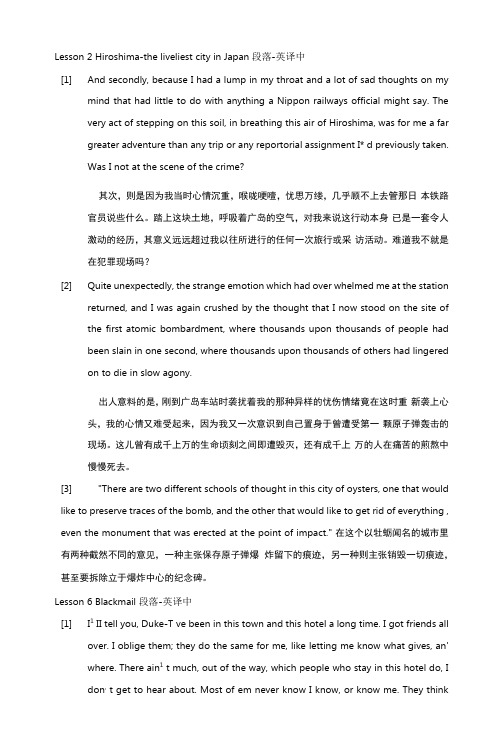
Lesson 2 Hiroshima-the liveliest city in Japan段落-英译中[1]And secondly, because I had a lump in my throat and a lot of sad thoughts on mymind that had little to do with anything a Nippon railways official might say. The very act of stepping on this soil, in breathing this air of Hiroshima, was for me a far greater adventure than any trip or any reportorial assignment I* d previously taken.Was I not at the scene of the crime?其次,则是因为我当时心情沉重,喉咙哽噎,忧思万缕,几乎顾不上去管那日本铁路官员说些什么。
踏上这块土地,呼吸着广岛的空气,对我来说这行动本身已是一套令人激动的经历,其意义远远超过我以往所进行的任何一次旅行或采访活动。
难道我不就是在犯罪现场吗?[2]Quite unexpectedly, the strange emotion which had over whelmed me at the stationreturned, and I was again crushed by the thought that I now stood on the site of the first atomic bombardment, where thousands upon thousands of people had been slain in one second, where thousands upon thousands of others had lingered on to die in slow agony.出人意料的是,刚到广岛车站时袭扰着我的那种异样的忧伤情绪竟在这时重新袭上心头,我的心情又难受起来,因为我又一次意识到自己置身于曾遭受第一颗原子弹轰击的现场。
高级英语第一册课文翻译和词汇

高级英语(第三版)第一册课文译文和词汇张汉熙版Lesson 2 Hiroshima - The "Liveliest" City in Japan(experts)广岛--日本“最有活力”的城市(节选) 雅各•丹瓦“广岛到了!大家请下车!”当世界上最快的高速列车减速驶进广岛车站并渐渐停稳时,那位身着日本火车站站长制服的男人口中喊出的一定是这样的话。
我其实并没有听懂他在说些什么,一是因为他是用日语喊的,其次,则是因为我当时心情沉重,喉咙哽噎,忧思万缕,几乎顾不上去管那日本铁路官员说些什么。
踏上这块土地,呼吸着广岛的空气,对我来说这行动本身已是一套令人激动的经历,其意义远远超过我以往所进行的任何一次旅行或采访活动。
难道我不就是在犯罪现场吗?这儿的日本人看来倒没有我这样的忧伤情绪。
从车站外的人行道上看去,这儿的一切似乎都与日本其他城市没什么两样。
身着和嘏的小姑娘和上了年纪的太太与西装打扮的少年和妇女摩肩接豫;神情严肃的男人们对周围的人群似乎视而不见,只顾着相互交淡,并不停地点头弯腰,互致问候:“多么阿里伽多戈扎伊马嘶。
”还有人在使用杂货铺和烟草店门前挂着的小巧的红色电话通话。
“嗨!嗨!”出租汽车司机一看见旅客,就砰地打开车门,这样打着招呼。
“嗨”,或者某个发音近似“嗨”的什么词,意思是“对”或“是”。
“能送我到市政厅吗?”司机对着后视镜冲我一笑,又连声“嗨!”“嗨!”出租车穿过广岛市区狭窄的街巷全速奔驰,我们的身子随着司机手中方向盘的一次次急转而前俯后仰,东倒西歪。
与此同时,这座曾惨遭劫难的城市的高楼大厦则一座座地从我们身边飞掠而过。
正当我开始觉得路程太长时,汽车嘎地一声停了下来,司机下车去向警察问路。
就像东京的情形一样,广岛的出租车司机对他们所在的城市往往不太熟悉,但因为怕在外国人面前丢脸,却又从不肯承认这一点。
无论乘客指定的目的地在哪里,他们都毫不犹豫地应承下来,根本不考虑自己要花多长时间才能找到目的地。
高级英语课件第一册第二课Hiroshima----the-Liveliest-City-in-Jap

• It is believed that more than 140,000 people died by the end of the year. The total number of people who have died due to the bomb is estimated to be 200,000.
2) To acquaint students with Japan and her traditions revealed in the text.
3) To enable students to appreciate the reportorial writing, i.e. facts and opinions.
• We spent the night in Yasu Shrine in Gion. Because of their burns, everyone was crying for water all night. The next morning, we were taken by truck to a Buddhist temple in Kabe. That night, my sister died. How can I describe Mother‘s grief ? How can I describe the horrible scenes I saw in the temple then? Who can imagine the miseries we went through except those who were there themselves? It is entirely beyond my power to put the terrible sight into words. Countless people suffering from burns and wounds, groaning with pain, their bodies covered with maggots(蛆), and dying in delirium(精神 错乱), one after another. It was hell on earth.
高级英语1高级英语第一册第二课PPT
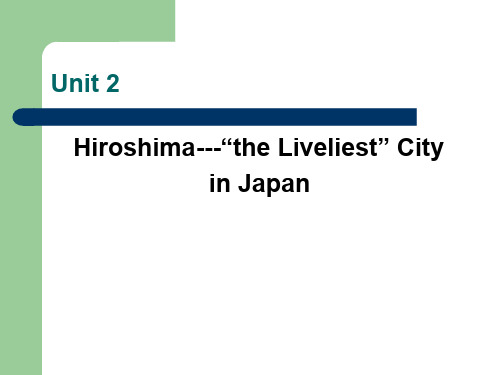
I. Background Information
4. 300-Year-Old Camphor Tree Uprooted By The Blast
5. A Building Brought To Knees By The Blast
I. Background Information
6. A Boy Who Received Radiation Burns On His Whole Body
3) The rather arresting spectacle of little old Japan adrift amid beige concrete skyscrapers is the very symbol of the incessant struggle between the kimono and the miniskirt.
arrival in Hiroshima Question: what was his attitude toward
Hiroshima?
III . Text Analysis
2. the plots the author looks for his destination.
3.the mayor’s speech and two schools of thought.
IV.Special Difficulties
2)The cab driver’s door popped open at the very sight of a traveler.
--As soon as the taxi driver saw a traveler, he immediately opened the door.
高级英语第一册 Hiroshima— the “Liveliest” City in Japan

2) formation of a narrative: A good narrative has a beginning, a middle and an end. 3) five aspects in writing a narrative: a. Purpose b. Selection of details c. Context d. Organization e. Point of view 4) three basic components of a narrative: Plot; Characters; Background.
Summary of the Text
In this text, the author narrates an experience of his journey in Hiroshima and what he has seen and understood there. Before having a real touch with the city, the author’s mind was occupied with a superficial impression that people there were sad and would remember the history which happened half a century ago. As he walks out of the station ,the attentive author notices some phenomenon of co-existence of Eastern and Western culture in Japan, such as the different clothing styles and traditional Japanese houses. The purpose of his journey is to interview the mayor of Hiroshima. The process of meeting with the mayor is described humorously and comically .The mayor and ordinary people don’t want to mention the bomb and misery any more. At first the author is puzzled why they are willing to hide the history. But after a talk with an old atomic victim, he begins to understand of their souls——the history get their mind hurt most and as an optimistic nation the Japanese want to expect the good future rather than the miserable past.
高级英语02_Hiroshima – the “Liveliest” City in Japan
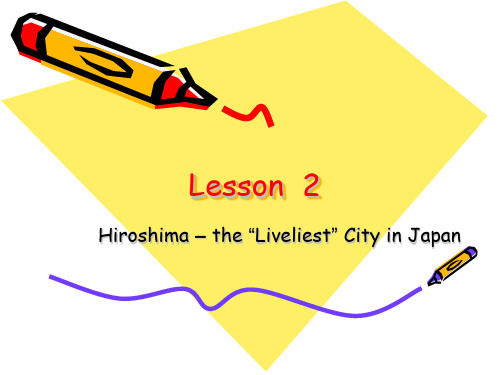
Ⅲ. Detailed study of
the text
▲ Organization of the article: Part 1: (paragraph1- 27) the author’s meeting of the mayor of the city of Hiroshima: Is the city the liveliest city? paragraph1-8: his experience from the station to the city hall. Paragraph9-27: his meeting of the mayor of the city.
Ⅳ. Appreciation of the
text
1.Effective Writing Skills 1). accurately recording the dialogues with some Japanese to reinforce the authenticity of the report 2). carefully observing and describing details to reinforce the authenticity of the report 3). vivid and humorous description to make the report interesting
3). What do we know about the cab driver and the usher? ①driver: kind hospitable knowing little of their city but paying much attention to their face.
高级英语Hiroshima课文原文
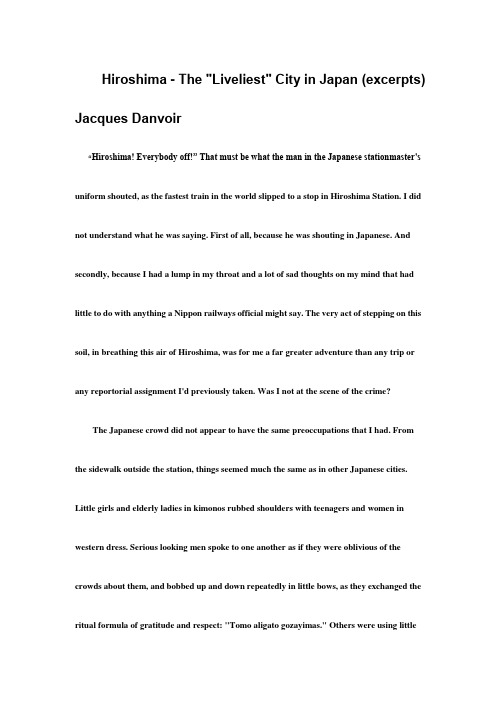
Hiroshima - The "Liveliest" City in Japan (excerpts) Jacques Danvoir“Hiroshima! Everybody off!” That must be what the man in the Japanese stationmaster's uniform shouted, as the fastest train in the world slipped to a stop in Hiroshima Station. I did not understand what he was saying. First of all, because he was shouting in Japanese. And secondly, because I had a lump in my throat and a lot of sad thoughts on my mind that had little to do with anything a Nippon railways official might say. The very act of stepping on this soil, in breathing this air of Hiroshima, was for me a far greater adventure than any trip or any reportorial assignment I'd previously taken. Was I not at the scene of the crime?The Japanese crowd did not appear to have the same preoccupations that I had. From the sidewalk outside the station, things seemed much the same as in other Japanese cities. Little girls and elderly ladies in kimonos rubbed shoulders with teenagers and women in western dress. Serious looking men spoke to one another as if they were oblivious of the crowds about them, and bobbed up and down repeatedly in little bows, as they exchanged the ritual formula of gratitude and respect: "Tomo aligato gozayimas." Others were using littlered telephones that hung on the facades of grocery stores and tobacco shops."Hi! Hi!" said the cab driver, whose door popped open at the very sight of a traveler. "Hi", or something that sounds very much like it, means "yes". "Can you take me to City Hall?" He grinned at me in the rear-view mirror and repeated "Hi!" "Hi! ’ We set off at top speed through the narrow streets of Hiroshima. The tall buildings of the martyred city flashed by as we lurched from side to side in response to the driver's sharp twists of the wheel.Just as I was beginning to find the ride long, the taxi screeched to a halt, and the driver got out and went over to a policeman to ask the way. As in Tokyo, taxi drivers in Hiroshima often know little of their city, but to avoid loss of face before foreigners, will not admit their ignorance, and will accept any destination without concern for how long it may take them to find it.At last this intermezzo came to an end, and I found myself in front of the gigantic City Hall. The usher bowed deeply and heaved a long, almost musical sigh, when I showed him the invitation which the mayor had sent me in response to my request for an interview. "That is not here, sir," he said in English. "The mayor expects you tonight for dinner with otherforeigners on the restaurant b oat. See? This is where it is.” He sketched a little map for me on the back of my invitation.Thanks to his map, I was able to find a taxi driver who could take me straight to the canal embankment , where a sort of barge with a roof like one on a Japanese house was moored . The Japanese build their traditional houses on boats when land becomes too expensive. The rather arresting spectacle of little old Japan adrift amid beige concrete skyscrapers is the very symbol of the incessant struggle between the kimono and the miniskirt.At the door to the restaurant, a stunning, porcelain-faced woman in traditional costume asked me to remove my shoes. This done, I entered one of the low-ceilinged rooms of the little floating house, treading cautiously on the soft matting and experiencing a twinge of embarrassment at the prospect of meeting the mayor of Hiroshima in my socks.He was a tall, thin man, sad-eyed and serious. Quite unexpectedly, the strange emotion which had overwhelmed me at the station returned, and I was again crushed by the thought that I now stood on the site of the first atomic bombardment, where thousands upon thousands of people had been slain in one second, where thousands upon thousands of othershad lingered on to die in slow agony .The introductions were made. Most of the guests were Japanese, and it was difficult for me to ask them just why we were gathered here. The few Americans and Germans seemed just as inhibited as I was. "Gentlemen," said the mayor, "I am happy to welcome you to Hiroshima."Everyone bowed, including the Westerners. After three days in Japan, the spinal column becomes extraordinarily flexible."Gentlemen, it is a very great honor to have you here in Hiroshima."There were fresh bows, and the faces grew more and more serious each time the name Hiroshima was repeated."Hiroshima, as you know, is a city familiar to everyone,” continued the mayor."Yes, yes, of course,” murmured the company, more and more agitated."Seldom has a city gained such world renown, and I am proud and happy to welcome you to Hiroshima, a town known throughout the world for its--- oysters".I was just about to make my little bow of assent, when the meaning of these last wordssank in, jolting me out of my sad reverie ."Hiroshima – oysters? What about the bomb and the misery and humanity's most heinous crime?" While the mayor went on with his speech in praise of southern Japanese sea food, I cautiously backed away and headed toward the far side of the room, where a few men were talking among themselves and paying little attention to the mayor's speech. "You look puzzled," said a small Japanese man with very large eye-glasses."Well, I must confess that I did not expect a speech about oysters here. I thought that Hiroshima still felt the impact of the atomic cataclysm .""No one talks about it any more, and no one wants to, especially, the people who were born here or who lived through it."Do you feel the same way, too?""I was here, but I was not in the center of town. I tell you this because I am almost an old man. There are two different schools of thought in this city of oysters, one that would like to preserve traces of the bomb, and the other that would like to get rid of everything, even the monument that was erected at the point of impact. They would also like to demolish theatomic museum.""Why would they want to do that?""Because it hurts everybody, and because time marches on. That is why." The small Japanese man smiled, his eyes nearly closed behind their thick lenses. "If you write about this city, do not forget to say that it is the gayest city in Japan, even it many of the town's people still bear hidden wounds, and burns."Like any other, the hospital smelled of formaldehyde and ether. Stretchers and wheelchairs lined the walls of endless corridors, and nurses walked by carrying nickel-plated instruments, the very sight of which would send shivers down the spine of any healthy visitor. The so-called atomic section was located on the third floor. It consisted of 17 beds."I am a fisherman by trade. I have been here a very long time, more than twenty years, "said an old man in Japanese pajamas. “What is wrong with you?”"Something inside. I was in Hiroshima when it happened. I saw the fire ball. But I had no burns on my face or body. I ran all over the city looking for missing friends and relatives. I thought somehow I had been spared. But later my hair began to fall out, and my belly turnedto water. I felt sick, and ever since then they have been testing and treating me. "The doctor at my side explained and commented upon the old man's story, "We still hare a handful of patients here who are being kept alive by constant care. The others died as a result of their injuries, or else committed suicide . ""Why did they commit suicide?""It is humiliating to survive in this city. If you bear any visible scars of atomic burns, your children will encounter prejudice on the part of those who do not. No one will marry the daughter or the niece of an atomic bomb victim. People are afraid of genetic damage from the radiation." The old fisherman gazed at me politely and with interest.Hanging over the patient was a big ball made of bits of brightly colored paper, folded into the shape of tiny birds. "What's that?" I asked."Those are my lucky birds. Each day that I escape death, each day of suffering that helps to free me from earthly cares, I make a new little paper bird, and add it to the others. This way I look at them and congratulate myself of the good fortune that my illness has brought me. Because, thanks to it, I have the opportunity to improve my character."Once again, outside in the open air, I tore into little pieces a small notebook with questions that I'd prepared in advance for interviews with the patients of the atomic ward. Among them was the question: Do you really think that Hiroshima is the liveliest city in Japan? I never asked it. But I could read the answer in every eye.。
高英Hiroshima习题解

高级英语第一册Lesson 2 Hiroshima -- the "Liveliest” city in Japan(习题详解)习题全解I .1)The writer must be an American journalist or reporter.2)The aim of the visit, I think, was to gather information about Hiroshima today.3)A lot of sad thoughts were on his mind. There were other visitors from abroad who didn't share his views. The first paragraph shows this to us clearly. 4)He felt a sense of guilt.5)The Japanese were not preoccupied with the same thought as the writer was.6)Hiroshima was different from other Japanese cities in that it was destroyed by an atomic bomb on August 6, 1945.7)Since then, it has been rebuilt with hard work and with the help of education, science and technology.8)One is an obvious conflict between western influences and the traditional customs. Another is that the impact of the 1945 bomb attack is still felt or seen till now.9)Because he thought it was unnecessary to do so since the answers were obvious after his talk with the patients.10)The answer was the Hiroshima was not the liveliest city in Japan.Ⅱ .1)They were so absorbed in their conversation that they seemed not to pay any attention to the people around them.2)As soon as the taxi driver saw a traveler, he immediately opened the door.3)The traditional floating houses among high modern buildings represent the constant struggle between old tradition and new development.4)1 suffered from a strong feeling of shame when I thought of the scene of meeting the mayor of Hiroshima wearing my socks only.5)The few Americans and Germans seemed just as restrained as 1 was.6)After three days in Japan one gets quite used to bowing to people as a ritual to show gratitude.7)1 was on the point of showing my agreement by nodding when I suddenly realized what he meant.His words shocked me out my sad dreamy thinking.8)I thought for some reason or other no harm had been done to me.Ⅲ.See the translation of the text.Ⅳ.1)n.+present participle:epoch—making,face—keeping,time consuming,nerve—wracking2)n.+past participle:home—made,bedridden,sun—burnt,heartfelt3)n.+adj.:pitch—dark,headstrong,duty—free,coal—black4)n.+n.+-ed:lion-hearted,iron-fisted,wall—eyed,brick—walled5)adj.+n.+-ed:stiff-necked,highminded,dull—witted,warm—blooded,empty—headed,cold—blooded6)adj.+present participle:high—sounding,hard—working, plain-sailing,far—reaching7)adj.+past participle:high—flown,new-born,finespun, high—strungⅤ.1)was指事实如此;而must be意为“很可能”。
高级英语第一册lesson 2课后习题答案
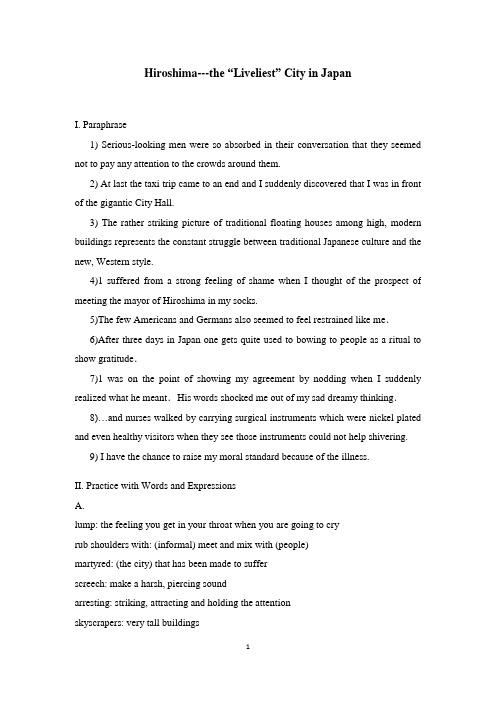
Hiroshima---the “Liveliest” City in JapanI. Paraphrase1) Serious-looking men were so absorbed in their conversation that they seemednot to pay any attention to the crowds around them.2) At last the taxi trip came to an end and I suddenly discovered that I was in frontof the gigantic City Hall.3) The rather striking picture of traditional floating houses among high, modernbuildings represents the constant struggle between traditional Japanese culture and the new, Western style.4)1 suffered from a strong feeling of shame when I thought of the prospect ofmeeting the mayor of Hiroshima in my socks.5)The few Americans and Germans also seemed to feel restrained like me.6)After three days in Japan one gets quite used to bowing to people as a ritual toshow gratitude.7)1 was on the point of showing my agreement by nodding when I suddenlyrealized what he meant.His words shocked me out of my sad dreamy thinking.8)…and nurse s walked by carrying surgical instruments which were nickel platedand even healthy visitors when they see those instruments could not help shivering.9) I have the chance to raise my moral standard because of the illness.II. Practice with Words and ExpressionsA.1.lump: the feeling you get in your throat when you are going to cry2.rub shoulders with: (informal) meet and mix with (people)3.martyred: (the city) that has been made to suffer4.screech: make a harsh, piercing sound5.arresting: striking, attracting and holding the attentionskyscrapers: very tall buildings6.stunning: very attractive; delightfully beautiful7.sink in: (to be) fully absorbed or understood8.schools: groups of people sharing the same thought9.by trade: by occupation; by way of making a livingB.1)was指事实如此;而must be意为“很可能”。
(完整word版)高级英语第一册lesson2课后习题答案.doc
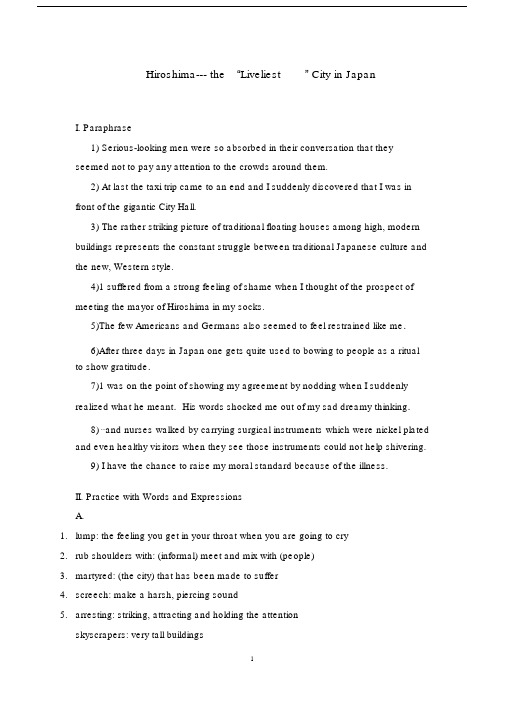
Hiroshima--- the“Liveliest” City in JapanI.Paraphrase1)Serious-looking men were so absorbed in their conversation that theyseemed not to pay any attention to the crowds around them.2)At last the taxi trip came to an end and I suddenly discovered that I was infront of the gigantic City Hall.3) The rather striking picture of traditional floating houses among high, modernbuildings represents the constant struggle between traditional Japanese culture and the new, Western style.4)1 suffered from a strong feeling of shame when I thought of the prospect ofmeeting the mayor of Hiroshima in my socks.5)The few Americans and Germans also seemed to feel restrained like me.6)After three days in Japan one gets quite used to bowing to people as a ritualto show gratitude.7)1 was on the point of showing my agreement by nodding when I suddenlyrealized what he meant. His words shocked me out of my sad dreamy thinking.8)⋯and nurses walked by carrying surgical instruments which were nickel platedand even healthy visitors when they see those instruments could not help shivering.9)I have the chance to raise my moral standard because of the illness.II. Practice with Words and ExpressionsA.1.lump: the feeling you get in your throat when you are going to cry2.rub shoulders with: (informal) meet and mix with (people)3.martyred: (the city) that has been made to suffer4.screech: make a harsh, piercing sound5.arresting: striking, attracting and holding the attentionskyscrapers: very tall buildings6.stunning: very attractive; delightfully beautiful7.sink in: (to be) fully absorbed or understood8.schools: groups of people sharing the same thought9.by trade: by occupation; by way of making a livingB.1)was 指事如此;而 must be 意“很可能”。
高级英语第二课习题答案
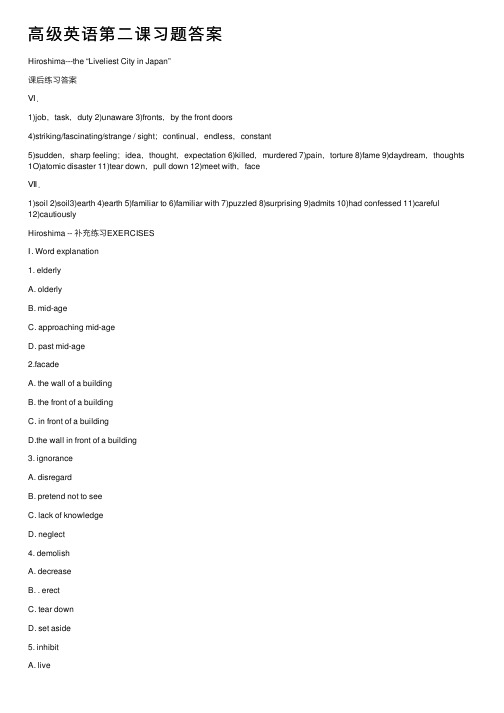
⾼级英语第⼆课习题答案Hiroshima---the “Liveliest City in Japan”课后练习答案Ⅵ.1)job,task,duty 2)unaware 3)fronts,by the front doors4)striking/fascinating/strange / sight;continual,endless,constant5)sudden,sharp feeling;idea,thought,expectation 6)killed,murdered 7)pain,torture 8)fame 9)daydream,thoughts 1O)atomic disaster 11)tear down,pull down 12)meet with,faceⅦ.1)soil 2)soil3)earth 4)earth 5)familiar to 6)familiar with 7)puzzled 8)surprising 9)admits 10)had confessed 11)careful12)cautiouslyHiroshima -- 补充练习EXERCISESⅠ. Word explanation1. elderlyA. olderlyB. mid-ageC. approaching mid-ageD. past mid-age2.facadeA. the wall of a buildingB. the front of a buildingC. in front of a buildingD.the wall in front of a building3. ignoranceA. disregardB. pretend not to seeC. lack of knowledgeD. neglect4. demolishA. decreaseB. . erectC. tear downD. set aside5. inhibitA. liveB. dwellC. suppressD. unlock6. bargeA. a kind of clothB. a kind of clothingC. a colour7. scarA. a woundB. a hidden woundC. a mark on the skinD. a mark of damage8. commitA. to doB. to commissionC. to trustD. to place an order9. preserveA. to keep from dangerB. . to serve in advanceC. . to saveD. . to reserve10. consist ofA. be composed ofB. be composed ofC. containD. include11. lumpB. massC. limpD. lung12. gratitudeA. appreciationB. thankfulnessC.gratefulnessD.all the above13. haltA. stopB. preventC. saluteD. alter14. destinationA. destinyB. desperateC. goalD. doom15. sketchA. stretchB. skepticD. drawⅡ. Replace each underlined part with one word learnt in the text, the first letter of which is given:1. The teacher answered with a brief nod of agreement.a2. The book was so interesting that I was practicallyunconscious of my surroundings. o3. The thought of his past experience of stealing bringshim a sudden sharp pain of conscience.t4. I see little hope of his recovery.p5. His greatest concern washow to find money for aholiday in Europe.p6. She shouldn't have come to the hotel suite. She shouldn't have delayed leaving --- this was fatal --- afterothers had left.l7. If I had been less careful I might have been morewise.c8. They faced one another in the boxing ring.e9. The town will build a monument to its war heroes.e10. She was deeply disturbed until she learned that herhusband was among the survivors.aⅢ. Fill in each of the blanks with one of the following words or expressions in its proper form. Each word or expression is to be used only once.to have a lump in one's throat, spare, spectacle, on the part of, rub shoulders with, humiliate, shiver, sink in, in response, foldtrouble as a consequence.2. The children at play among the flowers made quite a4. Twice I put the request to him, but he said nothing5. All during her mother's funeral, Alice6. You should disdain7.they'll be easier to carry.her by foreign invaders.9. The victorious enemy10. Judging from thecold outsideⅤ. Reading comprehension.1. The sentence “little girls and elderly ladies in kimonos rubbed shoulders with teenagers and women in western dress”shows that __.A. western influence and national traditionco-existed in JapanB. There were lots of female walking in the streets.C. . Little girls and elderly women wore kimonos but teenagers and women wore western dressD. Women in Japan wore different clothes2. The sentence “the usher bowed deeply and heaved a long, almost musical sigh” shows that __.A. the usher was pleasant and loved musicB. the usher was bored but still very politeC. the was boring but still kept his politenessD. the usher was boring but still wanted to keep himself in pleasant mood3.The author’s description of the mayor “he was a tall, thin man, sad-eyed and serious” shows that __.A. the meeting with the author who was an American reminded the mayor of the atomic crimeB. the mayor must be in sad mood that night.C. the author’s own mentality distorted the image of the mayorD. the mayor did not want to talk with the author4. The sentence “there are two different schools of thought in this city of oysters” means __.A. people in Hiroshima hold different opinions on the A-bomb attackB. people in Hiroshima hold different opinions on World War IIC. people in Hiroshima hold different opinions on how to treat the remnants of the A-bomb attack.D. people in Hiroshima hold different opinions on how to preserve their memory of the A-bomb attack5. The sentence “the very sight of which would send shivers down the spine of any healthy visitor” means __.A. any healthy visitor would feel uneasy when he saw the medical instrumentsB. Any healthy visitor would start trembling when he saw the medical instrumentsC. the medical instruments were burnished and coldD. as soon as he saw the cold medical instruments, the visitor began shivering6. The expression “earthly cares” in this text can be best understood as __.A. daily worries such as food, clothing and etcB. global considerations such as environment and etcC. social conflicts such as terrorism, disarmament and etc.D. everyday business such as economy and finance and etc.第⼀册第2课练习答案1-1: /答案:D1-2: /答案:B 1-3: /答案:C 1-4: /答案:C 1-5: /答案:C 1-6: /答案:D 1-7: /答案:D 1-8: /答案:A 1-9: /答案:A 1-10: /答案:A 1-11: /答案:B 1-12: /答案:D 1-13: /答案:A 1-14: /答案:C 1-15: /答案:D 2-1: /答案:assent2-2: /答案: oblivious2-3: /答案:twinge2-4: /答案:prospect答案:preoccupation2-6: /答案: lingered2-7: /答案: cautious2-8: /答案:encountered2-9: /答案:erect3-0: /答案: agitated3-1: /答案: sink in3-2: /答案: spectacle3-3: /答案: on the part of3-4: /答案: in response3-5: /答案: had a lump in her throat答案: to rub shoulders with 3-7: /答案: Fold3-8: /答案:humiliating3-9: /答案:spared3-10: /答案: shivering 4-1: /答案:A4-2: /答案:B4-3: /答案:C4-4: /答案:D4-5: /答案:A4-6: /答案:A。
- 1、下载文档前请自行甄别文档内容的完整性,平台不提供额外的编辑、内容补充、找答案等附加服务。
- 2、"仅部分预览"的文档,不可在线预览部分如存在完整性等问题,可反馈申请退款(可完整预览的文档不适用该条件!)。
- 3、如文档侵犯您的权益,请联系客服反馈,我们会尽快为您处理(人工客服工作时间:9:00-18:30)。
8. “seldom has a city gained such world renown, and I am proud and happy to welcome you to Hiroshima, a town known throughout the world for its--oysters.”(para.17)
Translation
1.And secondly, because I had a lump in my throat and a lot of sad thoughts on my mind that had little to do with anything a Nippon railways official might say.(Para.1 L.5)
Martyr 烈士,折磨,殉难;flash by 一闪 而过;lurch from side to side 东倒西歪
那座曾经惨遭劫难的城市的一座座高楼大
厦从我们身边飞掠而过,而我也随着司机 方向盘的一次次急转而在车里东倒西歪。
6.At the door to the restaurant, a stunning, porcelain-faced woman in traditional costume asked me to remove my shoes.(para.8)
Step on 踏上;previously以前
对我来说,踏上广岛的土地,呼吸着这里
的空气,这件事本身就非常令人激动,其 意义远远超过我任何一次旅行或采访活动。 我真的是在曾经的犯罪现场吗?
3.Serious looking men spoke to one another as if they were oblivious of the crowds about them, and bobbed up and down repeatedly in little bows…“Tomo aligato gozayimas.”(para.2)
在水上餐厅的门口,一位身着传统和服·妆 容精致的曼妙迎宾女郎告诉我要脱鞋进屋。
7.Quite unexpectedly, the strange emotion which had overwhelmed me at the station returned, and I was again crushed by the thought that I now stood on the site of the first atomic bombardment, where thousands of people had been slain in one second, where thousands upon thousands of others had lingered on to die in slow agony.(para.9)
overwhelm压倒,淹没;crush by破坏,毁坏;slain in杀死; linger to缓慢消失,继续存留
出乎意料地,刚到广岛车站时的那种异样的忧伤情
绪竟在这时重新袭上我的心头。当我想到自己现在是 站在第一颗原子弹爆炸的地方时,心情又ቤተ መጻሕፍቲ ባይዱ重起来。 就在这儿,成千上万人的生命在原子弹爆炸的一刹那 被毁灭,另有成千上万的人在痛苦的煎熬中慢慢死去。
oyster 牡蛎
很少有城市像广岛那般举世闻名,因此我
既高兴又自豪地欢迎各位来到广岛。令这 座城市如此著名的乃是它的---牡蛎。
9. “there are two different schools of thought in this city of oysters, one that would like to preserve traces of the bomb, and the other that would like to get rid of everything even the monument that was erected at the point of impact.”(para.25)
trace遗迹;monument纪念碑;erect竖立
在这个牡蛎之城,有两种截然不同的看法,
一种是主张保留轰炸的遗址,另一种主张 销毁一切痕迹,甚至连竖立在轰炸中心的 纪念碑也拆掉。
10.“if you write about this city, do not forget to say that it is the gayest city in Japan, even if many of the town’s people still bear hidden wounds, and burns.”(para.27)
Have a lump in one’s throat 如鲠在喉,哽咽
二则是因为我当时心情沉重,喉咙哽咽,忧思绵 绵,我心中所想的同日本铁路工作人员说什么毫 不相干。
2.The very act of stepping on this soil, in breathing this air of Hiroshima, was for me a far greater adventure than any trip or any reportorial assignment I’d previously taken. was I not at the scene of the crime?(para.1)
oblivious to/of sth 未注意,忘记了
神情严肃的男人们互相交谈着,似乎是对
周围拥挤的人群视而不见。他们不停地微 微欠身鞠躬,互致着客套的日常问候: “太谢谢您了”。
4.The tall building of the martyred city flashed by as we lurched from side to side in response to the driver’s sharp twists of the wheel.(para.3)
